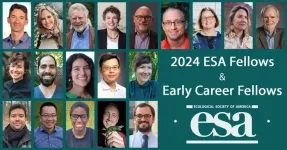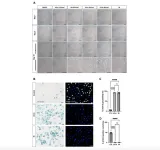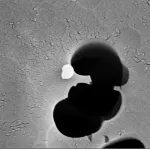(Press-News.org) As an undergraduate student in The University of Texas at Arlington’s Honors College, Hannah Selvarathinam knew she wanted to conduct research. Near the end of her first year at UTA, the Keller native reached out to the lab of biology Assistant Professor Piya Ghose.
“Hannah has been a very impressive scholar from Day 1,” Ghose said. “She had the foresight to reach out for research opportunities very early on.”
Ghose brought Selvarathinam in to work on one of the lab’s core projects related to the genetics of cell death, modeled in the roundworm Caenorhabditis elegans. Selvarathinam’s work eventually led to her honors thesis, focused on brain health and behavior. The result is a new peer-reviewed publication detailing the genes affecting worm behavior that also are relevant to neurological disease in humans.
“Through combing the literature and discussing her findings with me, she was able to make connections between the genes she was already studying as part of her cell biology project with her undergraduate psychology major and interests in human health,” Ghose said. “Hannah drove this project and regularly communicated with me for guidance and to share her exciting results. She took on the brave task of adapting and optimizing a published behavioral protocol for her project, which is exceptional for such a young trainee.”
For her study, Selvarathinam leveraged the fact that worms have similarities in their genes to humans and predictable behaviors that are easy to study. She proceeded to optimize an experi-mental protocol that aimed to link the mental illness schizophrenia to neurodegenerative disease using worm behavior.
“Normally, worms spend much of their time eating. But if they are interrupted by physical insult, they briefly stop in a manner similar to the startle response in humans,” Selvarathinam said.
Schizophrenia has similar symptoms, and one hallmark is abnormal reactivity to a continued stimulus. Essentially, individuals with the illness take longer to become accustomed to a stimulus than those without.
“What we found in our study is that healthy worms, as expected, momentarily stopped eating when they were exposed to a stimulus, but soon continued to eat again,” Selvarathinam explained. “But for worms with mutations in many of the neurodegeneration genes, such as with those related to hereditary spastic paraplegia and Alzheimer’s disease, they continued to eat even after being exposed to the stimulus, which shows a heightened startle response.
“Our publication adds another building block to our understanding of brain disease in the hopes of finding a cure and also highlights C.elegans as a powerful model organism to pursue this goal.”
After completing her honors thesis and graduating in winter 2022, Selvarathinam began working as a technician in Ghose’s lab while preparing applications for medical school. She’s now on track with another peer-reviewed publication for work she has done assisting on one of the lab’s cell death projects.
“My research experience complements my goal to practice medicine by teaching me many transferable skills, such as reading scientific literature and applying my knowledge to solve problems and answer interesting questions,” Selvarathinam said. “I am grateful for the opportunities I have had at UTA and for the chance to work with the Ghose Lab team. I am also thankful to the Honors College for its wonderful capstone project program. I encourage students to reach out to professors and seek out research opportunities here at UTA.”
END
UT Arlington student links worm behavior to brain disease
Psychology student worked with biology faculty to study neurological
2024-04-30
ELSE PRESS RELEASES FROM THIS DATE:
Uncovering the secret of long-lived stem cells
2024-04-30
Nothing lives forever, but compared to other cells in the body, hematopoietic stem cells (HSCs) are remarkably long-lived. HSCs are blood-forming cells – they give rise to rapidly dividing progenitor cells, which in turn generate hundreds of billions of cells to fulfill the daily demand of oxygen-delivering red blood cells, disease-fighting white blood cells and clot-forming platelets.
HSCs typically remain dormant within the bone marrow, yet they possess the ability to activate and replenish blood cells continuously, maintaining a relatively youthful profile throughout the life of an organism. What is the secret of ...
The question for online educational platforms: offer courses following a schedule or release them on demand?
2024-04-30
Researchers from Carnegie Mellon University and University of Pennsylvania published a new Journal of Marketing study that examines online educational platforms and the question of whether they should release content through a scheduled format that resembles a traditional university course or use an on-demand release strategy.
The study, forthcoming in Journal of Marketing, is titled “More Likely to Pay but Less Engaged: The Effects of Switching Online Courses from Scheduled to On-Demand Release on User Behavior” and ...
Study: racial bias is no 'false alarm' in policing
2024-04-30
Black drivers are more frequently searched during traffic stops without finding contraband than white drivers, according to a University of Michigan study.
Institute for Social Research scientists Maggie Meyer and Richard Gonzalez analyzed data from 98 million traffic stops, and showed that innocent Black drivers were likely to be searched about 3.4 to 4.5 percent of the time while innocent white drivers were likely to be searched about 1.9 to 2.7 percent of the time. Their results are published in the Journal of Quantitative Criminology.
"We show that there's ...
Ecological Society of America announces 2024 Fellows
2024-04-30
The Ecological Society of America is pleased to announce its 2024 Fellows. The Society’s fellowship program recognizes the many ways in which its members contribute to ecological research, communication, education, management and policy. This year, the ESA Governing Board has confirmed nine new Fellows and ten new Early Career Fellows.
Fellows are members who have made outstanding contributions to a wide range of fields served by ESA, including, but not restricted to, those that advance or apply ecological knowledge in academics, ...
Mass General Brigham researchers identify potential drivers of chronic allergic inflammation
2024-04-30
Currently, most therapies for allergic diseases require lifelong treatment. Allergic reactions, characterized by ongoing (type 2) inflammation in response to chronic antigen exposure, underlie many chronic diseases in humans, including asthma, atopic dermatitis, ulcerative colitis and more. T helper 2 (Th2) cells play an important role in the body's immune response, particularly in allergic reactions. Despite their central role, the sustained activity of Th2 cells during allergic reactions, even in the face of constant antigen exposure, has long puzzled researchers.
A research team that included authors from Mass General Brigham, including ...
Scientists solve chemical mystery at the interface of biology and technology
2024-04-30
Link to release:
https://www.washington.edu/news/2024/04/30/oects/
Researchers who want to bridge the divide between biology and technology spend a lot of time thinking about translating between the two different “languages” of those realms.
“Our digital technology operates through a series of electronic on-off switches that control the flow of current and voltage,” said Rajiv Giridharagopal, a research scientist at the University of Washington. “But our bodies operate on chemistry. In our brains, neurons ...
Shaping the Future of Neuroendocrine Tumor Management
2024-04-30
MIAMI, FLORIDA (April 30, 2024) – Newly updated guidelines on neuroendocrine tumors developed by an expert at Sylvester Comprehensive Cancer Center at the University of Miami Miller School of Medicine and collaborators provide clinicians with the latest recommendations for staging and management of these rare but increasingly diagnosed tumors.
The guidelines, developed for the American Joint Committee on Cancer (AJCC) and summarized today in CA: A Cancer Journal for Clinicians, highlight recent changes for treating these tumors and offer a snapshot of this rapidly evolving ...
Scientists show ancient village adapted to drought, rising seas
2024-04-30
Around 6,200 BCE, the climate changed. Global temperatures dropped, sea levels rose and the southern Levant, including modern-day Israel, the Palestinian territories, Jordan, Lebanon, southern Syria and the Sinai desert, entered a period of drought.
Previously, archaeologists believed that this abrupt shift in global climate, called the 8.2ka event, may have led to the widespread abandonment of coastal settlements in the southern Levant. In a recent study published with the journal Antiquity, researchers at UC San Diego, the University of Haifa and Bar-Ilan University share new evidence suggesting at least one village formerly thought abandoned not only remained occupied, but ...
Cover paper: Senescent characteristics of human corneal endothelial cells upon UV-A exposure
2024-04-30
“[...] these findings may help to advance our understanding of the pathogenesis of corneal endothelial disease and may lead to the discovery of new therapies targeting senescent cells.”
BUFFALO, NY- April 30, 2024 – A new research paper was published on the cover of Aging (listed by MEDLINE/PubMed as "Aging (Albany NY)" and "Aging-US" by Web of Science) Volume 16, Issue 8, entitled, “Senescent characteristics of human corneal endothelial cells upon ultraviolet-A exposure.”
In ...
Activity in a room stirs up nanoparticles left over from consumer sprays
2024-04-30
Common household products containing nanoparticles – grains of engineered material so miniscule they are invisible to the eye – could be contributing to a new form of indoor air pollution, according to a Rutgers study.
In a study published in the journal Science of the Total Environment, a team of Rutgers researchers found people walking through a space, where a consumer product containing nanoparticles was recently sprayed, stirred residual specks off carpet fibers and floor surfaces, projecting them some three ...
LAST 30 PRESS RELEASES:
Tiny bubbles, big breakthrough: Cracking cancer’s “fortress”
A biological material that becomes stronger when wet could replace plastics
Glacial feast: Seals caught closer to glaciers had fuller stomachs
Get the picture? High-tech, low-cost lens focuses on global consumer markets
Antimicrobial resistance in foodborne bacteria remains a public health concern in Europe
Safer batteries for storing energy at massive scale
How can you rescue a “kidnapped” robot? A new AI system helps the robot regain its sense of location in dynamic, ever-changing environments
Brainwaves of mothers and children synchronize when playing together – even in an acquired language
A holiday to better recovery
Cal Poly’s fifth Climate Solutions Now conference to take place Feb. 23-27
Mask-wearing during COVID-19 linked to reduced air pollution–triggered heart attack risk in Japan
Achieving cross-coupling reactions of fatty amide reduction radicals via iridium-photorelay catalysis and other strategies
Shorter may be sweeter: Study finds 15-second health ads can curb junk food cravings
Family relationships identified in Stone Age graves on Gotland
Effectiveness of exercise to ease osteoarthritis symptoms likely minimal and transient
Cost of copper must rise double to meet basic copper needs
A gel for wounds that won’t heal
Iron, carbon, and the art of toxic cleanup
Organic soil amendments work together to help sandy soils hold water longer, study finds
Hidden carbon in mangrove soils may play a larger role in climate regulation than previously thought
Weight-loss wonder pills prompt scrutiny of key ingredient
Nonprofit leader Diane Dodge to receive 2026 Penn Nursing Renfield Foundation Award for Global Women’s Health
Maternal smoking during pregnancy may be linked to higher blood pressure in children, NIH study finds
New Lund model aims to shorten the path to life-saving cell and gene therapies
Researchers create ultra-stretchable, liquid-repellent materials via laser ablation
Combining AI with OCT shows potential for detecting lipid-rich plaques in coronary arteries
SeaCast revolutionizes Mediterranean Sea forecasting with AI-powered speed and accuracy
JMIR Publications’ JMIR Bioinformatics and Biotechnology invites submissions on Bridging Data, AI, and Innovation to Transform Health
Honey bees navigate more precisely than previously thought
Air pollution may directly contribute to Alzheimer’s disease
[Press-News.org] UT Arlington student links worm behavior to brain diseasePsychology student worked with biology faculty to study neurological






